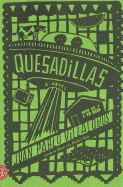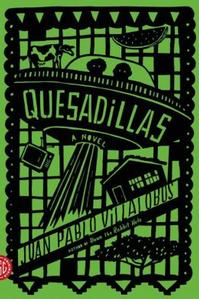

Like Villalobos' first novel, Down the Rabbit Hole, Quesadillas is a child's skewed vision of life, but this time the story is much funnier, with an economic vision of Mexico from the bottom up that's alternately heartbreaking and hilarious, as when Oreo confesses to a priest, "Forgive me, Father, for being poor."
Propelling the family toward disaster is temperamental, foul-mouthed Father, who teaches citizenship at the local state school. Dinnertime in their crowded home is open warfare for the quesadillas, which vary in serving size and contents as the family's fortunes fluctuate. A huge, luxurious new home is constructed next to the family shoebox to accommodate three chubby blue-eyed people who smell nice and wear ironed clothes. The new Polish neighbor has become vastly wealthy by scientifically impregnating cows with high-quality bull sperm. When the five-year-old twins go missing, 15-year-old Aristotle becomes convinced they've been abducted by aliens and takes Oreo with him to burglarize the neighbor's pantry for supplies and then set out on a quest to rescue them. Blamed for the burglary, Oreo is forced to work on cattle insemination farms and plans revenge.
Riddled with hoaxes, scams and folk beliefs, laced with the proverbs of poverty ("God tightens the noose but doesn't strangle you"), Quesadillas is frequently laugh-out-loud funny. Populated by chanting revivalists and scheming con men, it's an effortless breeze of a black comedy, not lingering one word too long anywhere. For Villalobos, life is a festival of coincidences, and the novel concludes with all the threads of the story converging in a comic fantasy celebration of this family's colorful slide from very poor to even poorer yet. --Nick DiMartino
Shelf-Talker: A darkly comic story about a poor Mexican family in which two teenage brothers set off to find their missing twin siblings--possibly abducted by aliens.

